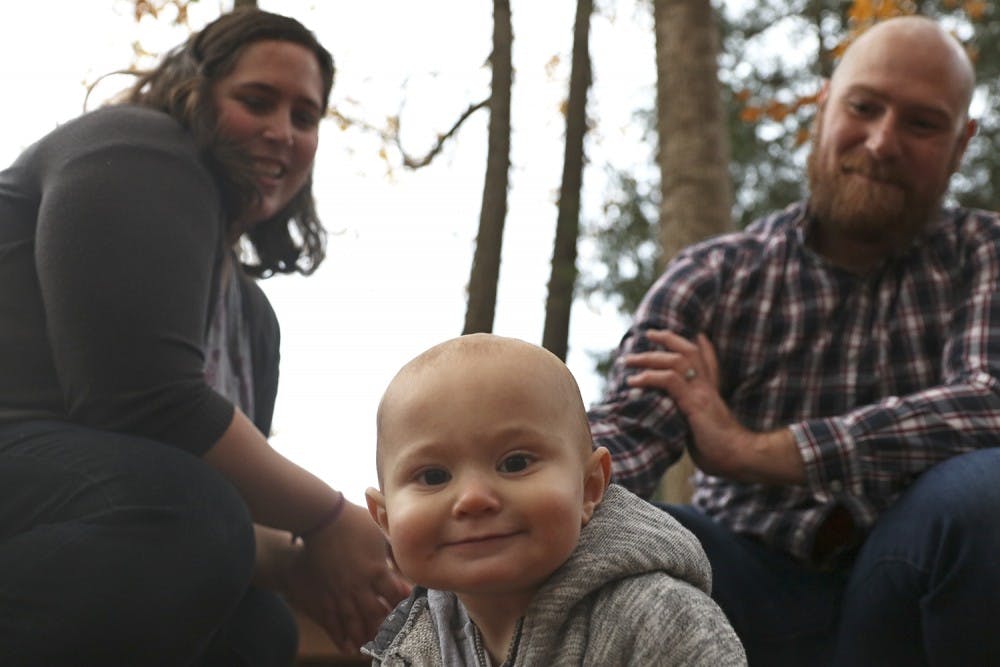At UNC, student parents can find resources and support with UNC’s human resources department and the Carolina Women’s Center.
Through its contract with the Child Care Services Association, the University offers child care subsidies to help parents like Czarnecki pay for day care.
UNC also operates the University Child Care Center at the William and Ida Friday Center for Continuing Education for students, faculty and staff, with a monthly fee of $1,030 to $1,380, before subsidies.
Clare Counihan, program coordinator for faculty and staff at the Carolina Women’s Center, said she works with 10 to 15 student-parents a year, but she knows there are more who don’t know about the resources offered.
Czarnecki said although he’s grateful for the financial assistance for child care he’s received from the University, he believes a day care center on main campus would be beneficial and justifiable given the number of student-parents at UNC.
“We pay a lot of fees for a lot of things, and I’m fine with fees going to a gym even though I don’t use it,” Czarnecki said. “I don’t think it’s too much to ask students to pay fees for something they don’t use. Especially if we had an onsite day care center I could drop him off at for the day and wouldn’t have to worry about coordinating buses and driving — it would be so unbelievably helpful.”
On-campus day care is particularly appealing to parents like international graduate student Francesca Sorbara.
While couples like the Czarneckis can match up their schedules to balance class work and time with their son, Sorbara is raising her 6-year-old son independently until her partner is able to come to the United States from Paraguay.
She said this semester has been manageable because most of her classes have been during her son’s school day or after school activities.
But she’s worried for next semester, she said, when her required courses are at night, keeping her on campus until 8 p.m. most nights.
Counihan said that although she believes a center would be beneficial, it wouldn’t be able to satisfy everybody’s needs, given the number of faculty, staff and students who have children.
This is the case at Johns Hopkins University, which opened the on-campus Homewood Early Learning Center in August 2015. JHU Communications Manager Karen Salinas said the waitlist to get in the center now has more than 30 infants.
To get the day's news and headlines in your inbox each morning, sign up for our email newsletters.
Reichlin said the lack of resources for student-parents is partially due to a general lack of awareness.
“We have seen kind of an uptick in the amount of coverage in the media this population has been getting in recent years,” she said. “It’s not at the level it should be to warrant the amount of action we need to support these parents in college, but I do think awareness is growing little by little.”
Czarnecki said he doesn’t think the general campus population realizes how much of a student-parent presence there is on campus.
As his peers take advantage of the libraries’ late night operating hours, Czarnecki runs on a different schedule than most.
“It’s kind of difficult for me to get back to campus after he goes to bed so that’s been the most difficult thing is that I’m just very limited on time,” he said. “So working with other students and sort of finding other students who understand the situation separates me from a lot of my fellow students and it can feel pretty isolating once in a while.”
Although fatherhood has led to more diaper changes and fewer parties for Czarnecki, he said that for him, it’s worth it.
“There’s times where I could spend another hour studying for an exam, or I could spend that hour playing with my son before he goes to sleep, and, generally, I’m willing to take a hit grade-wise to spend more time with my son.”
@yayjennic
enterprise@dailytarheel.com




